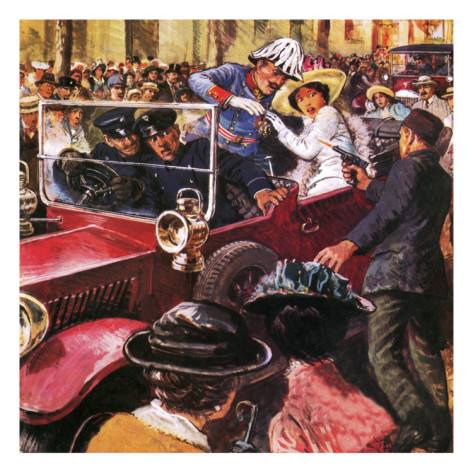‘And so they have killed our Ferdinand,’ said the chairwoman to Mr Svejk, who had left military service years before, after having been finally certified by an army medical board as an imbecile, and now lived by selling dogs – ugly, mongrel monstrosities whose pedigrees he forged.
‘Which Ferdinand, Mrs Muller?’, he asked. ‘I know two Ferdinands. One is a messenger at Prusa’s the chemist’s, and once by mistake he drank a bottle of hair oil there. And the other is Ferdinand Kokoska, who collects dog manure. Neither of them is any loss.’
‘Of no, sir, it’s His Imperial Highness, the Archduke Ferdinand, from Konopiste, the fat churchy one.’
‘Jesus Maria!’ exclaimed Svejk. ‘What a grand job!’
(Jaroslav Hasek, The Good Soldier Svejk)
Months away of the centennial anniversary of the assassination of Archduke Franz Ferdinand of Austria, the spark igniting the First World War, most of the general public knows as little about the Balkans as Svejk did in 1914. Entangled in their troublesome transitions, with European aspirations, but also internal problems with nationalism and complicated post-Yugoslav identities, the Balkans attract our attention, if ever, only during clashes, riots, protests, contested elections or controversial referenda.
The little attention given to the region is regrettable, not least because – one hundred years after the start of the First World War – South Eastern Europe does not cease to be a litmus paper that exposes Western divisions. Situated in the heart of the European Union’s enlargement focus area, the region is set to become increasingly important for the future of a progressively united – or divided, for that matter – Europe. The unfinished political and economic transitions in the region, the post-Yugoslav identity crisis, the troubled societies, the still many overlooked areas – all these issues call for greater attention and insight.
At LSEE Research on South Eastern Europe, we pride ourselves on providing a space for open debate and engagement of the latest academic research on the region through our rich agenda of public events. The foremost aim of this blog is to take the engagement online, by presenting the research of LSE & non-LSE academics to the wider public, in a manner which endeavours to be as open and accessible as possible. Through a wide range of articles – analyses, interviews, reviews of external resources, live blogs, maps, infographics – the LSEE Blog will provide you with regular, Balkan food for thought.
Enjoy the reading and feel free to contribute with your own expertise by contacting our editorial team and suggesting new topics.




“So they’ve done it to us,” said the cleaning woman to Mr. Švejk. “They’ve killed our Ferdinand.”
I dutifully report that there are several things of interest to those inquiring about me:
1. There is a new English translation: http://zenny.com
2. There is continuing research into Jaroslav Hašek’s life and the book about my Fateful Adventures: http://honsi.org/literature/svejk/
3. There is a Facebook page: https://www.facebook.com/SvejkCentral
“Švejkologists of the world . . .
come together!
Right now!!!”